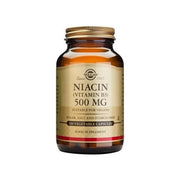100,000+ Orders Shipped
Call us free: 0800 098 8888
Family Run 40 Years +
Money Back Guarantee
Vitamin B3 (Niacin)
Can’t find what you are looking for? Contact Us and we will look to get it for you (at a great price and no delivery charge). If you are the first person to suggest a new product to us that we start to keep in stock, we’ll even send you one for free!
Vitamin B3 (Niacin), which is otherwise known as vitamin B3, is a hydrophilic B vitamin that could be found in some foods, supplemented to other food products and available as dietary supplements. Nicotinic acid and nicotinamide are the two most familiar forms of niacin for human consumption. Tryptophan — an unsaturated amino acid — can be converted into nicotinamide by the body. Since niacin is soluble in water, any additional amounts of it that the body does not need will be flushed out with the urine. Niacin functions as a coenzyme responsible for regulating more than 400 enzymes involved in different reactions, assisting in propelling nutrients into energy, fabricating cholesterol and fats, constructing and mending DNA structures, as well as exhibiting antioxidant qualities.
Recommended Amounts
The RDA for niacin is 14-16 mg NE for adults aged 19 and up, which is the same as 1 mg of niacin or 60 mg of tryptophan. Pregnant women need 18 mg NE, while lactating women should consume 17 mg NE.
Food Sources
A niacin deficiency is rare because it is found in many foods, both from animals and plants.
- Red meat: beef, beef liver, pork
- Poultry
- Fish
- Brown rice
- Fortified cereals and breads
- Nuts, seeds
- Legumes
- Bananas
Supplements
Nicotinic acid or nicotinamide are the forms of niacin which can be taken as supplements. Sadly, exceeding RDA amounts may bring adverse reactions like burning flushes. Nicotinic acid, which is prescribed for high cholesterol, comes in an expanded-release shape that enables slower, smoother absorption to prevent any flushing effects. As much as 2,000 mg of niche tinic acid is needed every day so this supplement should be used under medical supervision only.
Signs of Deficiency and Toxicity
Niacin deficiency is uncommon in America and other industrialized countries because it can be easily consumed from most foods or obtained from vitamins. Severe niacin deficiency might cause pellagra, manifested by a dark scaly rash on exposed skin, bright redness of the tongue, and constipation/diarrhea.
Additional symptoms include:
- Depression
- Headache
- Fatigue
- Memory loss
- Hallucinations
- Groups at risk for deficiency
Those facing poverty, limited dietary variety, or particular illness may not have access to a balanced diet and can be at greater risk. Nations with corn or maize as the primary food source may develop pellagra due to their low levels of absorbable niacin and tryptophan.
Severe alcohol abuse can lead to a decrease in the absorption of nutrients, especially the B vitamins.
Carcinoid Syndrome is a type of cancer that causes the tryptophan found in your diet to turn into serotonin instead of niacin, resulting in lower levels of niacin and increasing the risk of complications.




